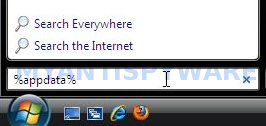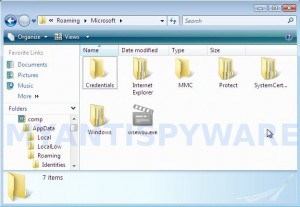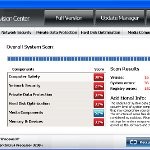 Windows Supervision Center is a fake antivirus program that hides Windows desktop, disables Task Manager and legitimate antvirus applications, blocks Windows programs from running and displays fake security alerts. It uses the name of Microsoft Windows and pretends to be a legitimate malware removal tool. As all rogueware applications from same family, it is distributed with the help of Microsoft Security Essentials Alert trojan. The trojan will display false information that states “Unknown Win32/Trojan was detected on your computer” and then suggest you to perform a scan of your PC. Once the scan is complete, it will report that a program is infected with Trojan.Horse.Win32.PAV.64.a and prompt you to install Windows Supervision Center to cure your computer. Remember, this fake antivirus is unable to detect or rid your system of parasites nor will be protect you from legitimate future threats, so you should never trust in anything related to this application! You need to remove Windows Supervision Center from your computer as quickly as possible!
Windows Supervision Center is a fake antivirus program that hides Windows desktop, disables Task Manager and legitimate antvirus applications, blocks Windows programs from running and displays fake security alerts. It uses the name of Microsoft Windows and pretends to be a legitimate malware removal tool. As all rogueware applications from same family, it is distributed with the help of Microsoft Security Essentials Alert trojan. The trojan will display false information that states “Unknown Win32/Trojan was detected on your computer” and then suggest you to perform a scan of your PC. Once the scan is complete, it will report that a program is infected with Trojan.Horse.Win32.PAV.64.a and prompt you to install Windows Supervision Center to cure your computer. Remember, this fake antivirus is unable to detect or rid your system of parasites nor will be protect you from legitimate future threats, so you should never trust in anything related to this application! You need to remove Windows Supervision Center from your computer as quickly as possible!
During installation, this malware will configure itself to start every time when your computer boots up. After the installation is done, it will reboot your computer. When Windows is loaded, you will be shown the Windows Supervision Center prompt instead of Windows desktop. The rogue will suggest to perform a scan of your computer. During the fake scan, this malware will list a lot of infections to trick you into thinking your PC in danger. It will report that was able to clean the majority of infected files, but was not able to cure a few important Windows files and offer to purchase its full version to clean them. However, the scan results is a scam, because Windows Supervision Center is neither able to detect, nor to remove anything from your computer, especially viruses or other kind of malware. Thus, do not pay for the bogus software, simply ignore all that the fake antivirus will display you.
Furthermore, the misleading application will display fake security alerts and notifications to scare you into thinking your computer has many serious security and privacy threats. You will likely see fake security notifications similar below:
Attention
Suspicious software activity is detected.
Please start system files scanning for details.
Warning!
Name: taskmgr.exe
Name: C:\WINDOWS\taskmgr.exe.
Just like false scan results above, all of these alerts are a fake and supposed to scare you into thinking your computer is in danger. You should ignore all of them!
As you can see, Windows Supervision Center is a scam. Most importantly, don’t pay for the program. Use a reputable anti-spyware program to scan your computer and delete this malware. Also read a Windows Supervision Center removal guide written below to see instructions how it can be eliminated automatically.
Automatic removal instructions for Windows Supervision Center
1. Once Windows loaded you will see a Windows Supervision Center screen. Click OK button to perform a fake scan. Once the scan is complete, press the “Fix Errors” button. Now you can close the program. Click “X” button at the top-right of Windows Supervision Center or press ALT + F4. After that your Windows Desktop will be available.
2. Click Start, Type in search field (if you use Windows XP, then Click Start, Run and type in Open field):
%APPDATA%
3. Press Enter. It will open the contents of Application Data folder (for Windows XP) or the contents of Roaming folder (for Windows Vista, Windows 7). Next open the Microsoft folder as shown in the screen below.
4. Locate randomly named file (e.g. wsewsu.exe or wsewsu, look the example above), right click to it and select Rename (don`t rename any folders). Type any new name (123.exe) and press Enter. Reboot your computer.
5. Download MalwareBytes Anti-malware (MBAM). Close all programs and Windows on your computer.
6. Double Click mbam-setup.exe to install the application. When the installation begins, keep following the prompts in order to continue with the installation process. Do not make any changes to default settings and when the program has finished installing, make sure a checkmark is placed next to Update Malwarebytes’ Anti-Malware and Launch Malwarebytes’ Anti-Malware, then click Finish.
7. If an update is found, it will download and install the latest version.
8. Once the program has loaded you will see window similar to the one below.
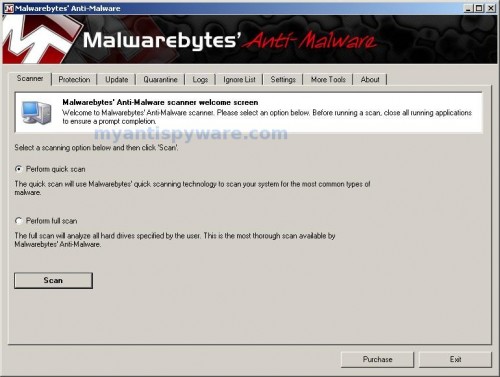
Malwarebytes Anti-Malware Window
9. Select Perform Quick Scan, then click Scan, it will start scanning your computer for Windows Supervision Center infection. This procedure can take some time, so please be patient.
10. When the scan is complete, click OK, then Show Results to view the results. You will see a list of infected items similar as shown below. Note: list of infected items may be different than what is shown in the image below.
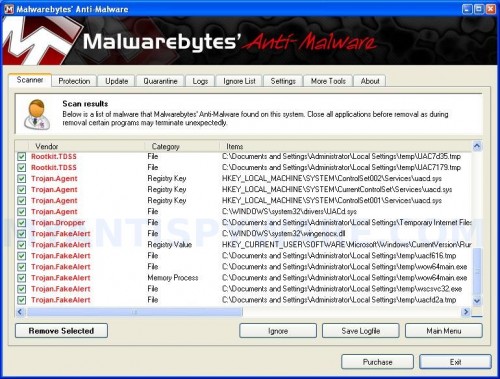
Malwarebytes Anti-malware, list of infected items
11. Make sure that everything is checked, and click Remove Selected for start Windows Supervision Center removal process. When disinfection is completed, a log will open in Notepad and you may be prompted to Restart.
Windows Supervision Center removal notes
Note 1: if you can not download, install, run or update Malwarebytes Anti-malware, then follow the steps: Malwarebytes won`t install, run or update – How to fix it.
Note 2: if you need help with the instructions, then post your questions in our Spyware Removal forum.
Note 3: your current antispyware and antivirus software let the infection through ? Then you may want to consider purchasing the FULL version of MalwareBytes Anti-malware to protect your computer in the future.
Windows Supervision Center creates the following files and folders
%AppData%\Microsoft\{RANDOM}.exe
Windows Supervision Center creates the following registry keys and values
HKEY_LOCAL_MACHINE\SOFTWARE\Microsoft\Windows NT\CurrentVersion\Image File Execution Options\avastsvc.exe
HKEY_LOCAL_MACHINE\SOFTWARE\Microsoft\Windows NT\CurrentVersion\Image File Execution Options\avastui.exe
HKEY_LOCAL_MACHINE\SOFTWARE\Microsoft\Windows NT\CurrentVersion\Image File Execution Options\msascui.exe
HKEY_LOCAL_MACHINE\SOFTWARE\Microsoft\Windows NT\CurrentVersion\Image File Execution Options\msmpeng.exe
HKEY_LOCAL_MACHINE\SOFTWARE\Microsoft\Windows NT\CurrentVersion\Image File Execution Options\msseces.exe
HKEY_LOCAL_MACHINE\SOFTWARE\Microsoft\Windows NT\CurrentVersion\Image File Execution Options\egui.exe | Debugger
HKEY_LOCAL_MACHINE\SOFTWARE\Microsoft\Windows NT\CurrentVersion\Image File Execution Options\ekrn.exe | Debugger
HKEY_CURRENT_USER\Software\Microsoft\Windows NT\CurrentVersion\Winlogon | Shell = “%AppData%\Microsoft\{random}.exe”
